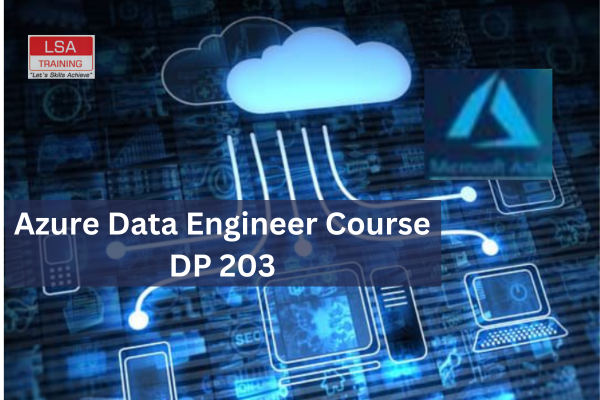
About Course
Candidates for this exam should have subject matter expertise integrating, transforming, and consolidating data from various structured and unstructured data systems into a structure that is suitable for building analytics solutions. Azure Data Engineers help stakeholders understand the data through exploration, and they build and maintain secure and compliant data processing pipelines by using different tools and techniques.
- Our Recruitment company details and open roles:https://lsarecruit.zohorecruit.in/careers
Duration: 1month ( Mon to fri, Sat & Sun 9am to 2pm ) - For fee and job assistance please call us on : 02033710546 or 07843259631 Email us : training@Lsatraining.co.uk
- Course Description
- Course Content
- Labs
- Highlights
Audience Profile :
Candidates for this exam should have subject matter expertise integrating, transforming, and consolidating data from various structured and unstructured data systems into a structure that is suitable for building analytics solutions. Azure Data Engineers help stakeholders understand the data through exploration, and they build and maintain secure and compliant data processing pipelines by using different tools and techniques. These professionals use various Azure data services and languages to store and produce cleansed and enhanced datasets for analysis. Azure Data Engineers also help ensure that data pipelines and data stores are high-performing, efficient, organized, and reliable, given a set of business requirements and constraints. They deal with unanticipated issues swiftly, and they minimize data loss. They also design, implement, monitor, and optimize data platforms to meet the data pipelines needs. A candidate for this exam must have strong knowledge of data processing languages such as SQL, Python, or Scala, and they need to understand parallel processing and data architecture patterns.
Placement assistance program through LSA Recruit:
At LSA TRAINING, we are committed to helping our students secure suitable job opportunities through our comprehensive Placement Assistance Program.
Key Features of the Program:
1. Scope: Our program assists LSA Training students in finding jobs in their desired industry sectors and roles.
2. Target Audience: Open to students who have successfully completed their training with LSA.
3. Employer Database: We maintain a database of potential employers relevant to students' skills and interests.
4. Partnerships: We establish partnerships with employers, attend career fairs, and participate in industry events to facilitate job placements.
5. Candidate Profiles: Detailed profiles are created outlining students' skills, knowledge, experience, and qualifications.
6. Career Coaching: We offer career advice, resume development, and interview preparation services.
7. Job Matching: Students are matched with potential employers based on their profiles and job requirements.
8. Interview Arrangements: We coordinate interviews between students and employers.
9. Feedback: Post-interview feedback is provided to help students improve their job search skills.
10. Success Monitoring: We track the success rate of placements and gather feedback from students and employers to continuously improve our services.
Contact Us:
For more details on our Recruitment Program, visit [www.Lsarecruit.co.uk], call us at +44 02039501453, or email us at Careers@Lsarecruit.co.uk.
Empower your career with LSA TRAINING and LSA Recruit.
- Lesson 01 – Introduction to Azure Synapse Analytics
- Lesson 02 – Describe Azure Databricks
- Lesson 03 – Introduction to Azure Data Lake storage
- Lesson 04 – Describe Delta Lake architecture
- Lesson 05 – Work with data streams by using Azure Stream Analytics
- Lesson 01 – Explore Azure Synapse serverless SQL pools capabilities
- Lesson 02 – Query data in the lake using Azure Synapse serverless SQL pools
- Lesson 03 – Create metadata objects in Azure Synapse serverless SQL pools
- Lesson 04 – Secure data and manage users in Azure Synapse serverless SQL pools
- Lesson 01 – Describe Azure Databricks
- Lesson 02 – Read and write data in Azure Databricks
- Lesson 03 – Work with Data Frames in Azure Databricks
- Lesson 04 – Work with Data Frames advanced methods in Azure Databricks
- Lesson 01 – Understand big data engineering with Apache Spark in Azure Synapse Analytics
- Lesson 02 – Ingest data with Apache Spark notebooks in Azure Synapse Analytics
- Lesson 03 – Transform data with Data Frames in Apache Spark Pools in Azure Synapse Analytics
- Lesson 04 – Integrate SQL and Apache Spark pools in Azure Synapse Analytics
- Lesson 01 – Use data loading best practices in Azure Synapse Analytics
- Lesson 02 – Petabyte-scale ingestion with Azure Data Factory or Azure Synapse Pipelines
- Lesson 01 – Data integration with Azure Data Factory or Azure Synapse Pipelines
- Lesson 02 – Code-free transformation at scale with Azure Data Factory or Azure Synapse Pipelines
Lesson 01 – Orchestrate data movement and transformation in Azure Data Factory or Azure Synapse Pipelines
- Lesson 01 – Secure a data warehouse in Azure Synapse Analytics
- Lesson 02 – Configure and manage secrets in Azure Key Vault
- Lesson 03 – Implement compliance controls for sensitive data
- Lesson 01 – Design hybrid transactional and analytical processing using Azure Synapse Analytics
- Lesson 02 – Configure Azure Synapse Link with Azure Cosmos DB
- Lesson 03 – Query Azure Cosmos DB with Apache Spark for Azure Synapse Analytics
- Lesson 04 – Query Azure Cosmos DB with SQL serverless for Azure Synapse Analytics
- Lesson 01 – Enable reliable messaging for Big Data applications using Azure Event Hubs
- Lesson 02 – Work with data streams by using Azure Stream Analytics
- Lesson 03 – Ingest data streams with Azure Stream Analytics
Lesson 01 – Process streaming data with Azure Databricks structured streaming
- Explore Azure Synapse Analytics
- Analyze data-with-sql
- Transform-data-with-sql
- Create and Analyze data in a lake database
- Analyze data in a data lake with Spark
- Transform data using Spark in Synapse Analytics
- Use Delta Lake with Spark in Azure Synapse Analytics
- Explore a relational data warehouse
- Load Data into a Relational Data Warehouse
- Build a data pipeline in Azure Synapse Analytics
- Use an Apache Spark notebook in a pipeline
- Use Azure Synapse Link for Azure Cosmos DB
- Use Azure Synapse Link for SQL
- Get started with Azure Stream Analytics
- Ingest realtime data with Azure Stream Analytics and Azure Synapse Analytics
- Create a realtime report with Azure Stream Analytics and Microsoft Power BI
- Use Microsoft Purview with Azure Synapse Analytics
- Explore Azure Databricks
- Use Spark in Azure Databricks
- Use Delta Lake in Azure Databricks
- Use a SQL Warehouse in Azure Databricks
- Automate an Azure Databricks Notebook with Azure Data Factory
Training Highlights
Interactive Learning: Enhanced interaction between students and faculty, as well as among students.
Comprehensive Materials: Detailed presentations with soft copy materials available for reference at any time.
Practical and Job-Oriented Training: Focus on practical skills with hands-on practice using software tools and real-time project scenarios.
Preparation for Interviews: Includes mock interviews, group discussions, and interview-related questions.
Cloud-Based Test Lab: Access to a cloud-based test lab for practicing software tools as needed.
Real-Time Project Domains: Discussions on real-time project domains to provide relevant context and experience.
Current Market Relevance: Teaching methods, tools, and topics are selected based on the current competitive job market.
Additional Course Benefits
Hands-On Experience: Gain practical experience with industry-relevant tools and techniques.
Real-Time Project Work: Work on real-time projects to build your portfolio and practical knowledge.
Interview-Based Training: Tailored training to help you excel in job interviews.
Expected Salary/Pay Package Guidance:
Contractors: £400 to £600 per day, depending on experience and skill set.
Permanent Positions: £50,000 to £100,000 per annum, based on experience and skills.

